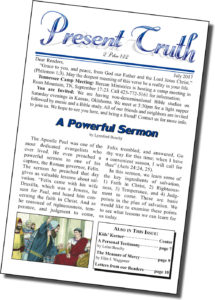 The Psalmist prayed, “Let Thy mercy, O Lord, be upon us, but according as we hope in Thee” (Psalm 33:22). This is an inspired prayer. It was prompted by the Holy Spirit, which helps our infirmities, and teaches what we ought to pray for (Romans 8:26). Therefore it is certain that the prayer is a proper one. It is just as certain that the standard of giving, which it calls for, is a just one. Since God directed the prayer to be uttered, that is evidence that He will grant the request.
The Psalmist prayed, “Let Thy mercy, O Lord, be upon us, but according as we hope in Thee” (Psalm 33:22). This is an inspired prayer. It was prompted by the Holy Spirit, which helps our infirmities, and teaches what we ought to pray for (Romans 8:26). Therefore it is certain that the prayer is a proper one. It is just as certain that the standard of giving, which it calls for, is a just one. Since God directed the prayer to be uttered, that is evidence that He will grant the request.
And what is the request? That the mercy of God should be bestowed upon us to the degree that we hope for it. What a wonderful range that is, within which we are permitted to draw upon the heavenly treasury! It is as though God has given us checks on the bank of heaven, with His name assigned to them, with the privilege of filling in any amount we wish. The prayer of the Psalmist is equivalent to a promise on the part of God that He will give us as much as we hope for.
But we remember that the mercy that we hope for is to be given us, and not what we would simply like to have. “For we are saved by hope; but hope that is seen is not hope; for what a man seeth, why doth he yet hope for?” (Romans 8:24). That is, we hope only for that thing which we do not see with our natural eyes. Hope means expectation as well as desire. Therefore we find that hope is inseparably connected with faith, and very closely allied to it. “Faith is the substance of things hoped for, the evidence of things not seen” (Hebrews 11:1). And our hope in God is the measure of the mercy that we receive from Him. So it is pretty hard to distinguish between faith and hope.
Perhaps the process by which the blessings of God are obtained, may briefly be noted thus: First, overpowered by a sense of need, we deserve something better than we have—something substantial. Then the rich promises of God are open before us, and faith in God’s word creates a hope that they may be ours; and then faith appropriates just to the amount of our hope. But the way in which it is done matters not, so long as we know that the grace bestowed will be according to the measure of our faith and hope. Since we may have whatever our faith in God’s Word prompts us to hope for, it is evident that our destiny is really in our own hands.
Nor need we fear that we shall exhaust the treasury of mercy. The word of truth says: “Thy mercy, O Lord, is in the heavens; and Thy faithfulness reacheth unto the clouds” (Psalm 36:5). And, “as the heaven is high above the earth, so is His mercy toward them that fear Him” (Psalm 103:11). So when we make perhaps according to our largest hopes, we may know that there is still enough left and to spare; for He “is able to do it exceedingly abundantly, above all that we ask or think” (Ephesians 3:20).
(This article was taken from the July 17, 1890 issue of The Present Truth. Editor)

